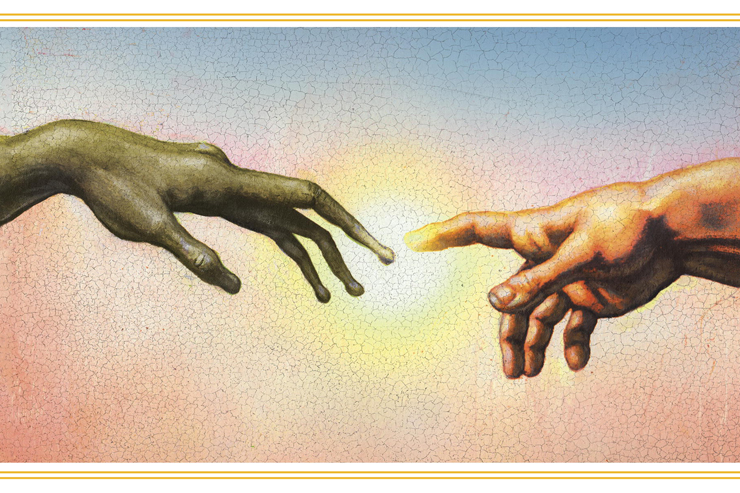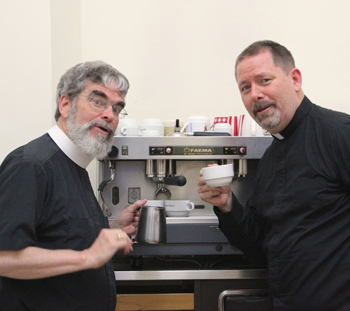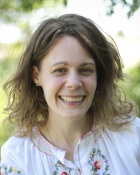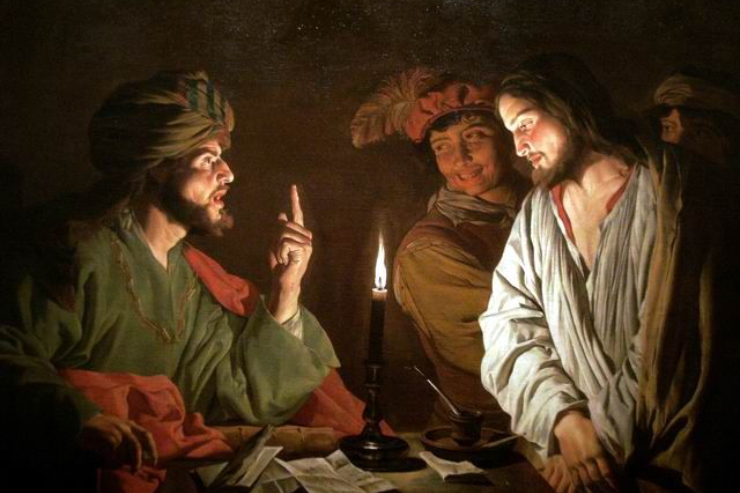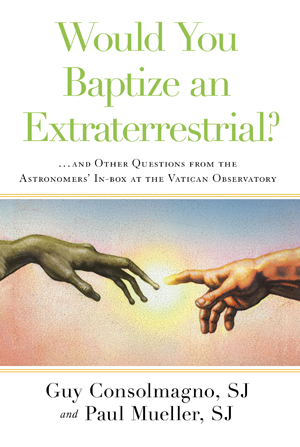 I’ve been enamored with Would You Baptize an Extraterrestrial? since the blue galley copy showed up in my mailbox. I haven’t read it all, but I’ve nibbled enough to know it’s full of wit and wisdom. My science-loving self can’t walk away from the proposition that’s in all the marketing copy: “Witty and thought provoking, two Vatican astronomers shed provocative light on some of the strange places where religion and science meet.”
I’ve been enamored with Would You Baptize an Extraterrestrial? since the blue galley copy showed up in my mailbox. I haven’t read it all, but I’ve nibbled enough to know it’s full of wit and wisdom. My science-loving self can’t walk away from the proposition that’s in all the marketing copy: “Witty and thought provoking, two Vatican astronomers shed provocative light on some of the strange places where religion and science meet.”
I had the chance to interview those two Vatican astronomers, Father Paul Mueller and Brother Guy Consolmagno. Not only are they full of knowledge and experience, they’re humble and humorous, too. Enjoy!
Fr. Paul and Br. Guy, you’re members of the research staff at the Vatican Observatory, a Jesuit priest and brother respectively, and probably busy with 500 other projects. How did you have time to compile all the information that’s in your new book?
Guy: If you want to get something done, find a busy person to do it! Actually, one of the strengths is that Paul and I have very different writing styles. Paul tends to write in intense bursts of a day or two, while I tend to nibble at things a few minutes at a time in between other projects.
Paul: We made time for it, because it seemed important to us! And to be honest, it wasn’t really a matter of compiling a lot of new information. It was more a matter of pulling together, organizing, and presenting in one place things we’d been saying in various contexts over the years.
What challenges do you face in your roles as Catholic scientists? What’s your biggest hurdle?
Guy: Our hurdles are no different at all from any other scientist… crafting a problem that is big enough to be interesting but small enough that we can hope to make visible progress in it; getting the resources we need to solve the problem; convincing our colleagues in the field that we have something worth saying… and listening to them trying to convince us of their projects. All this while doing all the other tasks of daily life, from community chores and duties to the necessary administrative tasks that keep our observatory functioning.
Paul: I’ll second what Guy said. The challenges that face Catholic scientists are the challenges that face all scientists. Science is concerned with seeking the truth about the physical world; that’s an arduous and challenging task. A Catholic seeks to live in accord with truths of science and also with Truth — which is also a difficult and arduous task.
How will reading your book help us better understand our faith or give us new insight?
Guy: They say, show don’t tell. We hope our book will be an entertaining way of showing what a life of faith and science looks like, from the inside.
Paul: And they say: Don’t explain, do! Our book tries to display the joy and challenge of living faith while doing science.
What has been the greatest blessing for you in your work as scientists?
Guy: The support of colleagues and friends and family, and the support of the Jesuits and Church. Working on a scientific project takes a long time, it’s a slow process with often no day-to-day highlights to keep you going, so this sort of support is really important.
Paul: I’ve long been amazed by the support which Jesuit order provides to its members who do research and study. The Jesuits seek to be at the service of the Church by providing Jesuit scientists and scholars. For me its a joy and blessing to feel that I’m at the service of the Church in that way.
At the end of the day, what do you count as your greatest success?
Guy: That the joy of the work continues to be its greatest reward; that’s where I find God.
Paul: Living as a person of hope, and leading others to live with hope.

